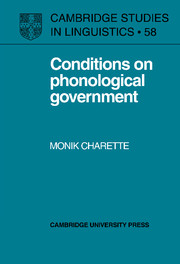Book contents
- Frontmatter
- Contents
- Preface
- Introduction
- 1 A theory of government in phonology
- 2 The ‘e-muet’ in French
- 3 Earlier treatments of schwa
- 4 An analysis of schwa in terms of government
- 5 Licence to govern
- 6 Word-final empty nuclei
- 7 Compounds and phrases
- 8 The alternation between schwa/zero and [ɛ]
- 9 Miscellaneous issues
- Conclusion
- Notes
- References
- Index
- Recent titles in Cambridge Studies in Linguistics
4 - An analysis of schwa in terms of government
Published online by Cambridge University Press: 10 December 2009
- Frontmatter
- Contents
- Preface
- Introduction
- 1 A theory of government in phonology
- 2 The ‘e-muet’ in French
- 3 Earlier treatments of schwa
- 4 An analysis of schwa in terms of government
- 5 Licence to govern
- 6 Word-final empty nuclei
- 7 Compounds and phrases
- 8 The alternation between schwa/zero and [ɛ]
- 9 Miscellaneous issues
- Conclusion
- Notes
- References
- Index
- Recent titles in Cambridge Studies in Linguistics
Summary
Introduction
In this chapter I propose a new account of the behaviour of schwa, aiming to demonstrate that its properties follow from general principles of phonological theory. From such a perspective, the behaviour of schwa is neither accidental nor is it specific to French. My analysis can be extended to other languages where similar phenomena are found. It will be argued that in languages where a vowel alternates with zero, the properties of this segment always follow from the same principles of the theory. What distinguishes one language from another is the nature of the segment which alternates with zero. Therefore, the alternation between [∅] and zero in French, between [u] and zero in Tangale, between [ə] and zero in Khalkha Mongolian and between [ɨ] and zero in Moroccan Arabic are accounted for in terms of the same set of principles and parameters. My analysis of schwa will also lead to a better understanding and to a sharpening of the theory of government.
Interestingly, my analysis embodies proposals that have been made by Selkirk (1978) and Anderson (1982) in their respective analyses of schwa. Like Anderson I analyse schwa as the phonetic interpretation of an underlying empty nucleus, and like Selkirk I consider that a given nucleus is in a binary relation with another nucleus.
- Type
- Chapter
- Information
- Conditions on Phonological Government , pp. 68 - 96Publisher: Cambridge University PressPrint publication year: 1991



